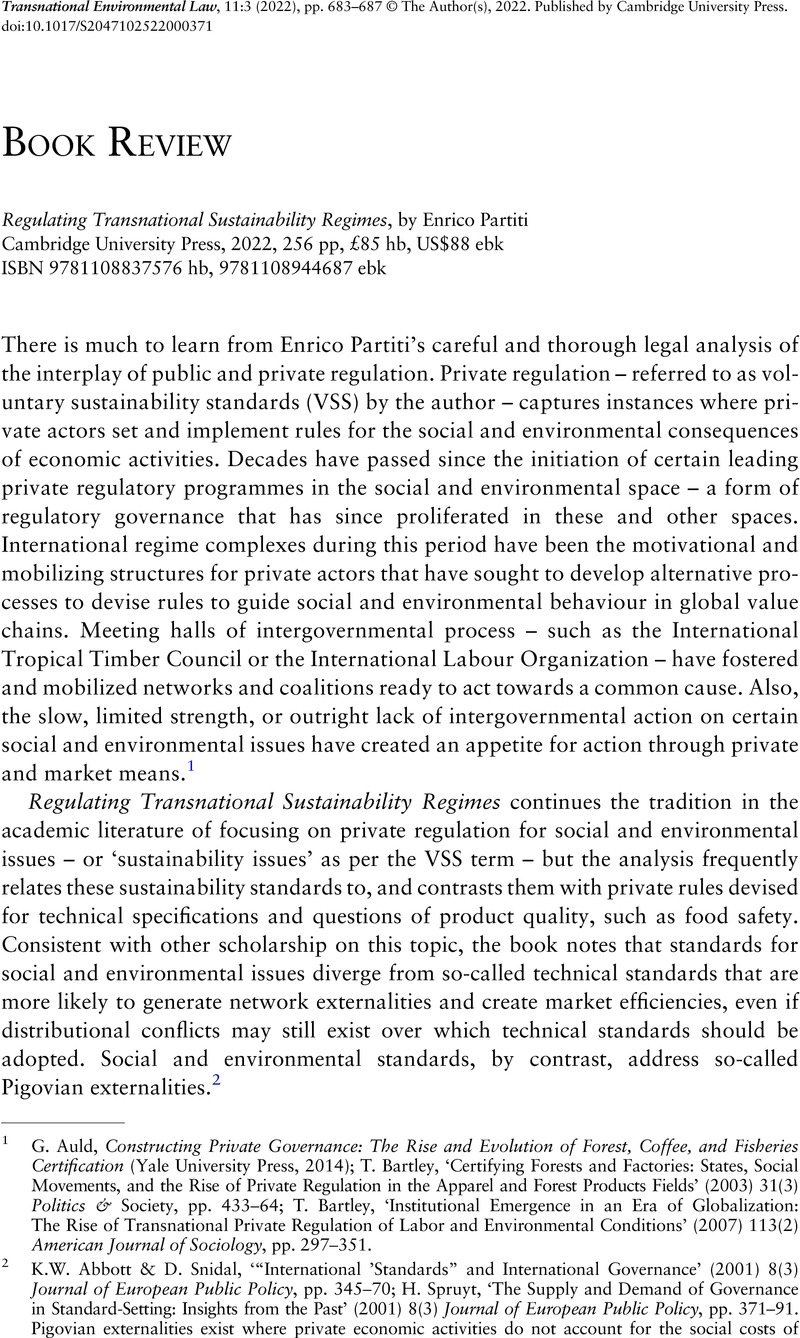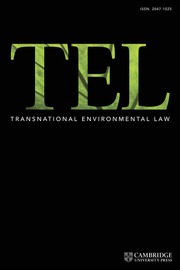No CrossRef data available.
Article contents
Regulating Transnational Sustainability Regimes, by Enrico Partiti Cambridge University Press, 2022, 256 pp, £85 hb, US$88 ebk ISBN 9781108837576 hb, 9781108944687 ebk
Review products
Published online by Cambridge University Press: 21 November 2022
Abstract

- Type
- Book Reviews
- Information
- Copyright
- Copyright © The Author(s), 2022. Published by Cambridge University Press.
References
1 Auld, G., Constructing Private Governance: The Rise and Evolution of Forest, Coffee, and Fisheries Certification (Yale University Press, 2014)CrossRefGoogle Scholar; Bartley, T., ‘Certifying Forests and Factories: States, Social Movements, and the Rise of Private Regulation in the Apparel and Forest Products Fields’ (2003) 31(3) Politics & Society, pp. 433–64CrossRefGoogle Scholar; Bartley, T., ‘Institutional Emergence in an Era of Globalization: The Rise of Transnational Private Regulation of Labor and Environmental Conditions’ (2007) 113(2) American Journal of Sociology, pp. 297–351CrossRefGoogle Scholar.
2 K.W. Abbott & D. Snidal, ‘“International 'Standards” and International Governance’ (2001) 8(3) Journal of European Public Policy, pp. 345–70; H. Spruyt, ‘The Supply and Demand of Governance in Standard-Setting: Insights from the Past’ (2001) 8(3) Journal of European Public Policy, pp. 371–91. Pigovian externalities exist where private economic activities do not account for the social costs of those economic activities. Market activities will thus underproduce social benefits and overproduce types of social harm.
3 Marrakesh (Morocco), 15 Apr. 1994, in force 1 Jan. 1995, available at: http://www.wto.org/english/docs_e/legal_e/06-gatt_e.htm.
4 Bartley (2003), n. 1 above, pp. 447–48; FSC website is available at: http://fsc.org.
5 Auld, n. 1 above, pp. 76–7, 100.
6 J.H. McNichol, ‘Contesting Governance in the Global Marketplace: A Sociological Assessment of Business-NGO Partnerships to Build Markets for Certified Wood’ (Ph.D., University of California – Berkeley (US), 2002), pp. 269–70; B. Cashore, G. Auld & D. Newsom, Governing through Markets: Forest Certification and the Emergence of Non-State Authority (Yale University Press, 2004). For discussion of US anti-trust law in the case of corporate responses to the Rana Plaza trajedy, see also E. Leitheiser, ‘How Domestic Contexts Shape International Private Governance: The Case of the European Accord and American Alliance in Bangladesh’ (2021) 15(4) Regulation & Governance, pp. 1286–303.
7 S. Renckens, Private Governance and Public Authority: Regulating Sustainability in a Global Economy (Cambridge University Press, 2020).
8 K.W. Abbott & D. Snidal, ‘Strengthening International Regulation through Transnational New Governance: Overcoming the Orchestration Deficit’ (2009) 42(2) Vanderbilt Journal of Transnational Law, pp. 501–78, at 558.
9 K.W. Abbott et al., International Organizations as Orchestrators (Cambridge University Press, 2015).
10 P. Schleifer, ‘Orchestrating Sustainability: The Case of European Union Biofuel Governance’ (2013) 7(4) Regulation & Governance, pp. 533–46; L.F. Henriksen & S. Ponte, ‘Public Orchestration, Social Networks, and Transnational Environmental Governance: Lessons from the Aviation Industry’ (2018) 12(1) Regulation & Governance, pp. 23–45; J. Lister, R.T. Poulsen & S. Ponte, ‘Orchestrating Transnational Environmental Governance in Maritime Shipping’ (2015) 34 Global Environmental Change, pp. 185–95; S. Ponte, Business, Power and Sustainability in a World of Global Value Chains (Bloomsbury, 2019).
11 Lisbon (Portugal), 13 Dec. 2007, in force 1 Dec. 2009 [2012] OJ C 326/47, available at: http://eur-lex.europa.eu/LexUriServ/LexUriServ.do?uri=OJ:C:2012:326:FULL:EN:PDF.
12 Commission Guidelines on the Applicability of Article 101 of the Treaty on the Functioning of the European Union to Horizontal Co-operation Agreements [2011] OJ C 11/01.
13 Marrakesh (Morocco), 15 Apr. 1994, in force 1 Jan. 1995 (TBT Agreement), available at: https://www.wto.org/english/docs_e/legal_e/17-tbt_e.htm.
14 Adopted by UN General Assembly Resolution 56/83, 12 Dec. 2001, UN Doc. A/56/49(Vol. I)/Corr.4, available at: https://legal.un.org/ilc/texts/instruments/english/draft_articles/9_6_2001.pdf.
15 Directive (EU) No. 2018/2001 on the Promotion of the Use of Energy from Renewable Sources [2018] OJ L 328/82.
16 Regulation (EU) No. 287/2017 Laying Down Supply Chain Due Diligence Obligations for Union Importers of Tin, Tantalum and Tungsten, their Ores, and Gold Originating from Conflict-Affected and High-Risk Areas [2017] OJ L 130/1.
17 Directive 2014/24/EU on Public Procurement [2014] OJ L 94/65.
18 Regulation (EU) No. 995/2010 Laying Down the Obligations of Operators Who Place Timber and Timber Products on the Market [2010] OJ L 295/13.
19 TBT Agreement, n. 13 above, Annex 3, Code of Good Practices for the Preparation, Adoption and Application of Standards.
20 Abbott & Snidal, n. 8 above.
21 H. van der Ven, Beyond Greenwash: Explaining Credibility in Transnational Eco-labeling (Oxford University Press, 2019), pp. 48–9.
22 P. Schleifer, M. Fiorini & G. Auld, ‘Transparency in Transnational Governance: The Determinants of Information Disclosure of Voluntary Sustainability Programs’ (2019) 13(4) Regulation & Governance, pp. 488–506.
23 ISEAL Alliance, ‘ISEAL Code of Good Practice for Setting Social and Environmental Standards’, 2006, available at: https://www.isealalliance.org/defining-credible-practice/iseal-codes-good-practice.
24 Schleifer, Fiorini & Auld, n. 22 above.
25 H. van der Ven, ‘Effects of Stakeholder Input on Voluntary Sustainability Standards’ (2022) 75 Global Environmental Change, article 102554.
26 E.A. Bennett, ‘Who Governs Socially-oriented Voluntary Sustainability Standards? Not the Producers of Certified Products’ (2017) 91 World Development, pp 53–69; S. Renckens & G. Auld, ‘Structure, Path Dependence, and Adaptation: North-South Imbalances in Transnational Private Fisheries Governance’ (2019) 166 Ecological Economics, article 106422.
27 Grabs, J., Selling Sustainability Short? The Private Governance of Labor and the Environment in the Coffee Sector (Cambridge University Press, 2020)CrossRefGoogle Scholar.
28 Auld, G. & Renckens, S., ‘Private Sustainability Governance, the Global South and COVID-19: Are Changes to Audit Policies in Light of the Pandemic Exacerbating Existing Inequalities?’ (2021) 139 World Development, article 105314CrossRefGoogle Scholar.
29 Silva-Castañeda, L., ‘What Kind of Space? Multi-Stakeholder Initiatives and the Protection of Land Rights’ (2015) 22(2) The International Journal of Sociology of Agriculture and Food, pp. 67–83Google Scholar.


